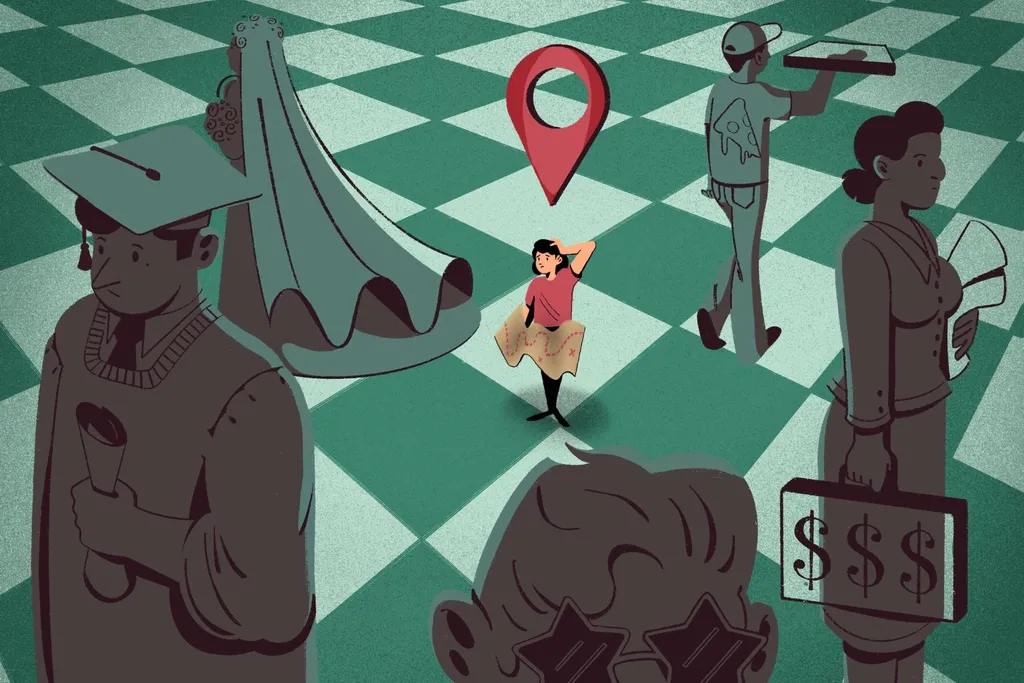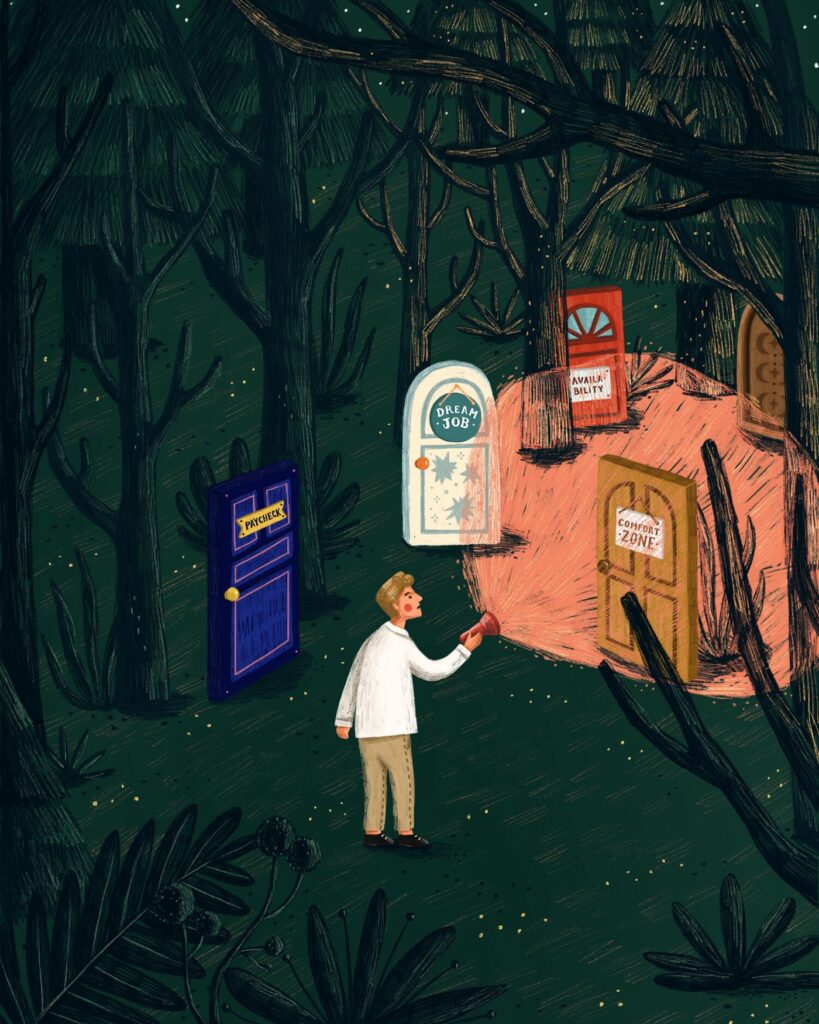By Rania Tsoli,
Our third decade has always been made out to include the best years of our lives, full of adventure and fun experiences, meeting all sorts of cool people and finding love, as well as being presented with amazing opportunities and making continuous progress without any setbacks. Our twenties are basically meant to have it all: completing bucket lists, while being careless and cherishing our youth, and simultaneously figuring everything out and making way for our thirties, ideally full of stability and certainty. This sort of pressure can naturally make anyone feel anxious about their decisions, panic about various aspects of their lifestyle, and almost obsessively wonder if they are truly satisfied with their choices and with where they seem to be headed in life.
The behaviors mentioned above are the most common symptoms of a phenomenon known as “quarter-life crisis”, and it most often affects people in their twenties, and perhaps their early thirties as well. Let us first get acquainted with the term, in order to dive into all that hides behind this sort of crisis, as well as the ways that can help successfully deal with it.
The quarter-life crisis, like the more well-known midlife crisis, is a moment of doubt and questioning that happens when people feel imprisoned, uninspired, and disillusioned. Most of the time, it involves feelings of stress and panic, usually triggered when an individual tries to figure out who they are and what they want out of life. If you experience a quarter-life crisis, you might feel lost, trapped – whether it is in your personal or in your professional environment –, and uninspired. As mentioned above, while this is said to be one of the best decades of our lives, there is also a heavy amount of pressure and quite a lot of struggles and anxiety that can stress us at this age, mostly regarding our plans for the future.

How long a quarter-life crisis lasts will vary based on the person, their personality, and current emotional state, as well as what triggers the crisis, but it is not rare for this phase to last for up to a few years. Many people experience dramatic upheaval, change, and disappointment during this time, which can lead to them feeling overwhelmed and unsure of themselves; it can take a lot of time to realize that something’s amiss, and perhaps even longer to figure out how to lead an adult life.
A quarter-life crisis can be triggered by many things, including living alone for the first time, navigating relationships, job searching and career planning, as well as making long-term professional or personal decisions. Comparison can be a big trigger of a quarter-life crisis as well, and it can involve seeing friends advance in their careers or have quality romantic relationships and feeling bad about not being in the same place as them. Thoughts along the lines of “Why is this not happening to me?” and “What am I doing wrong?” might occur, causing the person to get stressed and eventually suffer the symptoms of the crisis. Common symptoms often include a sense of impulsiveness and the need for change.
A telltale sign of a quarter-life crisis is an acute sense that something is off and therefore has to change as soon as possible, without much thought put into it. There is an urgent need for change, but people often do not know what that change needs to look like in order to be fulfilled; that is where the impulsive decisions start taking place. Going through a quarter-life crisis can also feel really isolating, and there is often a sense of being the only one struggling, while everyone else already has their life figured out – and, unfortunately, these feelings of loneliness may often be accompanied by anxiety and depression. A general lack of motivation and direction in this phase in one’s life is also very common. Lastly, another big component of a quarter-life crisis is insecurity; we are talking about a young adult trying to figure out their place and identity in the world, and that by itself can at times feel daunting. A sudden or gradual decrease in confidence – and even Impostor syndrome – is not unusual.

As we have gathered so far, powering through a quarter-life crisis is no easy feat, but there are thankfully many solutions to help us overcome it. First things first. The importance of seeking support if you are going through a crisis cannot be stressed enough. It is important to lean on your personal support system and confide in a friend, a partner, or a family member, while – if needed – a mental health professional can also be of great assistance. When it comes to supporting, though, it is important to remember that you have to figure out what is truly best for you; it is not about letting someone dictate to you in order to make them happy and not disappoint them, but about your own satisfaction with what you are doing in life.
Of course, keep in mind that this goes both ways: If you know someone who is struggling with a quarter-life crisis and you want to help them, be there for them while embracing their emotions with patience and supportiveness, and try to be objective and keep your personal opinions more on the quiet side; you do not want them to feel cornered and pushed towards something that might not be truly best for them.
In addition to this, a big part of a quarter-life crisis is figuring out who you are and where you want to go in life, so taking time to intentionally reflect can be really helpful. While at it, try to be patient with yourself; hard as it may be to accept, you do not need to have it all figured out before you turn thirty. What you want out of life will likely keep changing as the years go by, and there is nothing wrong with that. Giving yourself compassion and focusing on simply doing the things that make you happy can make the whole process feel a lot easier. Last but certainly not least, if you look at it from a more optimistic point of view, this is a time to explore your inner self and the life surrounding you. Give yourself permission to try things and test the waters with what you like and what you do not; you can sort of treat this like an experiment. This way, it will be easier to figure out what works and what does not.

There is nothing more common than having a quarter-life crisis during your early adulthood. You have important decisions to make, and the pressure everyone seems to be putting on you does not make things any easier. Everything seems uncertain, and you often feel like this is not “it’”, while having no idea what “it” actually is – and what we might have to realize is that sometimes there is not actually an “it” for everything. We often have the tendency to watch life unfold while wearing our rose-colored glasses and looking for the ideal, without realizing that many things are not meant to fit us perfectly.
There is endless beauty to life, but there is rarely true perfection; and, to be honest, I have always preferred the imperfect. There is no time limit; be as slow or as fast as you need, without letting others tell you when the “right time” is. There is also no need to chase perfection; as long as it feels good and makes you happy, you can be as sloppy as you want with your life. Take it one step at a time, put trust in your choices – both past and present ones. And of course, have fun while cherishing everything around you.
References
- Are You Going Through A Quarter-Life Crisis? What Experts Want You To Know, mindbodygreen.com, Available here
- Understanding The Quarter-Life Crisis, onlinedegrees.bradley.edu, Available here




